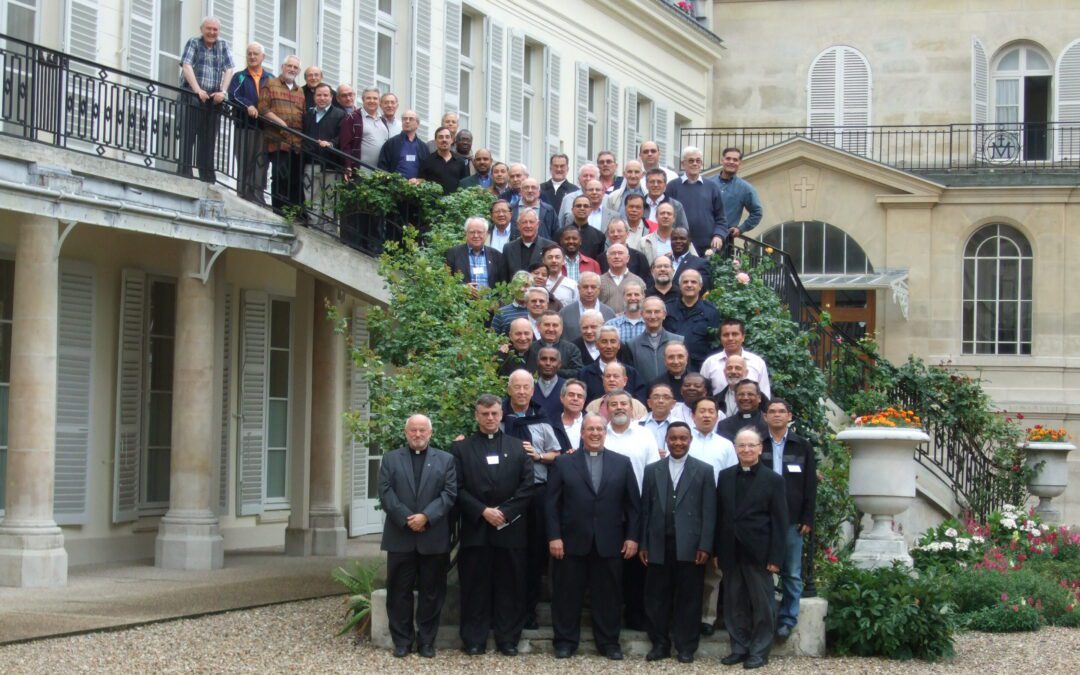 “One of the many issues that came up indirectly at the Daughters of Charity Provincial Directors Meeting in Paris in July 2012 was ‘New Evangelization’ and reaching out to those who have ‘left the Church’. While the discussion and comments on this topic went on, the unruly thought went through my mind – when we talk about people having left the Church, in some situations we could well ask ‘who has left who?’ I suggest the answer is not always as clear-cut as we might like to think ! ”
“One of the many issues that came up indirectly at the Daughters of Charity Provincial Directors Meeting in Paris in July 2012 was ‘New Evangelization’ and reaching out to those who have ‘left the Church’. While the discussion and comments on this topic went on, the unruly thought went through my mind – when we talk about people having left the Church, in some situations we could well ask ‘who has left who?’ I suggest the answer is not always as clear-cut as we might like to think ! ”
So begins a reflection by Tim Williams CM on Evangelization, the “New Evangelization”, and ourselves being evangelized. You can download the full reflection through the link ON BEING EVANGELIZED.
ON BEING EVANGELIZED
Tim Williams CM
September 4, 2012
One of the many issues that came up indirectly at the Daughters of Charity Provincial Directors Meeting in Paris in July 2012 was “New Evangelization” and reaching out to those who have “left the Church”. While the discussion and comments on this topic went on, the thought went through my mind – when we talk about people having left the Church, in some situations we could well ask “who has left who?”[1] I suggest the answer is not always as clear-cut as we might like to think !
Some weeks ago, I helped a couple whom I shall call Jane and John (not their real names) prepare a Funeral Service and Mass for Jane’s recently deceased mother. Jane and John were a very affable couple, though naturally under some stress. Jane explained to me that her mother was a person of deep faith, and a practicing Catholic all her life. She had brought Jane up in the Catholic Tradition. But she herself, Jane, had wandered away from the Catholic Church in her late teens, and when in later years she felt the need of religion and faith, found that the presence of Jesus Christ eluded her in the Catholic Church, and that the Catholic Church’s attitude to equality of women was off-putting to say the least. After some searching, Jane found a home with the Salvation Army, to whom she has remained committed.
Because of her mother’s faith, Jane wanted the funeral service to be the full Catholic Mass. Her husband John, who belonged to the Uniting Church Tradition, was happy to support his wife and to help in any way he could. Then Jane produced the draft copy of the booklet for the Order of Service. It was as near to perfect as one could get. She explained that a couple of friends had given some advice, but that she had basically drawn it up herself. Readings were chosen, prayers of intercession written and readers organized, music arranged, offertory procession, eulogy, symbols, pall – everything was there.
Several days later, at the actual Funeral Mass, the liturgy was well carried out, with Jane, John and others looking after readings, prayers of intercession, bringing up the gifts and eulogy. Jane herself went to communion (she believes in the Eucharist). She and other members of the Salvation Army were there in uniform, and sang beautifully. It was as prayerful and meaningful a funeral liturgy as I have ever attended.
So, has Jane really left the Church ? In the eyes of some, she might be classed as a “cafeteria Catholic”, choosing what part of the Tradition of Christianity she wants to accept – and should be “brought back to the faith” in order to have the “truth”. For my part, I felt that I myself was being evangelized by Jane and her husband – and I found it difficult to believe that Jane is not part of the Church, despite her own claim that she had left it. Perhaps it is the Catholic and Christian Tradition which needs to reassess itself ?
Evangelization
In 1975, Pope Paul VI wrote in Evangelii Nuntiandi: The Church is an evangelizer, but she begins by being evangelized herself …….Having been sent and evangelized, she then sends out evangelizers…….[2] In this document, issued before the time the term “New Evangelization” had been coined, some fundamentals of a renewed evangelization were laid out by Paul VI. When we read the document, it is clear that evangelization in our time is not just shouting the same message in a louder voice, but attempting to announce the Gospel with freshness and by whatever means are available. And a basic component for the Church is that it first allow itself to be evangelized, that it listen to what those in the Church, and those who claim no affiliation with it – are saying, even when this does not completely conform to what the Church would like to hear. One of the many challenges to the Church at the present time is to listen – and be evangelized.
In our Church Tradition, there are those who have great difficulty in going beyond what the Tradition has always been for them, and find it very difficult to listen to what others are saying about developing the Tradition further. But they don’t need to get stuck in the past !
Then there are those who call us to go forward to make radical changes in attitudes and in the way our Christian and Catholic Tradition should develop. These people are the ones who focus on keeping our Tradition alive, fresh and relevant – and stop it from becoming dessicated and moribund. Many of them might be classed as prophets – and they call us forward. Some of them will be voices from outside, some from within. But they don’t need to discard our basic Tradition.
There is a tendency in our Church to think that we must follow either one or the other of the above approaches. Our Christian Tradition needs stability and foundation, and it also needs development. So can’t it be “both/and” rather than “either/or”. In the early Church. Peter and Paul epitomised this.
And in the Vincentian Family …….?
It is not difficult to apply this thinking to our own Vincentian Family Traditions. The members of our Vincentian Family value the heritage left to us by Louise de Marillac and Vincent de Paul. In their day, they were prophets, and we still need prophets now who will hold our heritage up to us for reflection and dialogue . Vincent and Louise evangelized one another. Vincent de Paul was affected by the man from Gannes, the people from Clichy and Châtillon. Frederic Ozanam was challenged by students in regard to the Church. We could come up with many other examples from our Vincentian Family and from those among whom we work and minister, especially the poor.
How and when have we ourselves been challenged and evangelized by people and events ?
[1] More properly, this might read who has left whom? But usage is sometimes less pedantic than correctness !
[2] Pope Paul VI, Apostolic Exhortation Evangelii Nuntiandi (“On Evangelization in the Modern World”), December 8, 1975, n 15.
Tags: CM, Congregation of the Mission, Daughters of Charity, evangelization, Tim Williams



Terrific presentation. Fr. Tom, you have passed it on in Spades!
Terific Presentation. Fr. Tom, you have passed on the Mantle in Spades!
Oh my gosh yikes, what is the message in this article? I am a 34 year old woman who fell away from my Catholic faith as a teen and returned to the Sacraments 6 years ago. The Catholic Faith is the truth, and it does not need to be changed to fit the beliefs people who fall away from the Faith acquire from other sources, it does not need to be adapted to be more like the Salvation Army or secular feminism (there is also an authentically Catholic feminism, a la John Paul II’s “letter to women”), rather we do very much need to teach the Faith, to children, to adults, to everyone. Someone who is Catholic remains Catholic for life, in the sense of being bound by canon law and the precepts of the Church. If “Jane” in the story believes in the sacramental Priesthood and the Real Presence of Christ in the Eucharist, then her adherence to the Salvation Army protestant church and perhaps even receiving their protestant communion is quite serious and logically inconsistent and one needs to gently help people to think that through, and realize one can either adhere to protestantism (Salvation Army), OR receive Communion in the Catholic Church, but not both. We know from Vatican II that anyone who, knowing that God has made the Catholic Church necessary for our salvation, refuses to enter or remain within it, cannot be saved. So, we know that God wills to save us through the Catholic Church, that the Catholic Church is Christ’s Bride and Body, united in the Sacrament of the Eucharist. A funeral can often be a time when someone away from the Church comes back into contact with it and there is an opportunity for evangelization and inviting the person back to the Faith, which should be most kind and gentle, but should be consistent with the truth, or else the person and others will be confused. A lot of Catholics today have little idea that Confession (if they have committed grave sins) and belief in Catholic teaching is necessary to be disposed to receive Communion. This is also part of the New Evangelization and the basic teaching that needs to occur. I do not say that the priest in the situation acted improperly, and it is lovely that the woman showed much good will in arranging the funeral Mass. But was she invited back to the Faith? How is it possible that the title of this would ask “who has left who?”
Excellent work, Father Tim. Sometime, those left behind do feel the loss and find ways to claw and scramble back home. It’s a step, one step by one step, to get back home. It sure makes it easier if, like the Father who ran to meet his lost Son, as he was struggling back home, the struggler is welcomed for for what he or she has to offer. gh